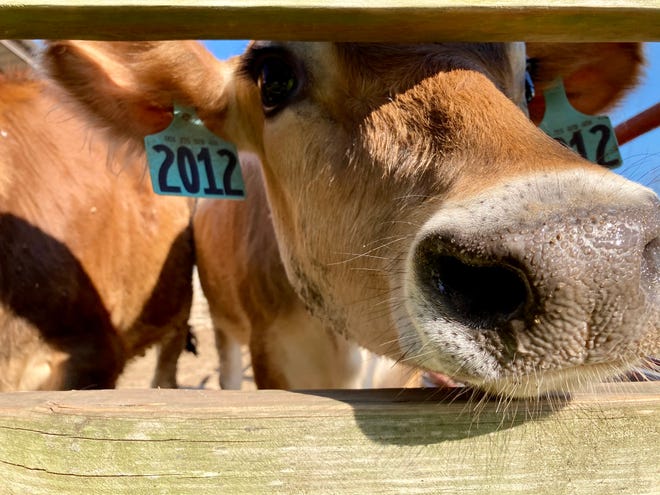Call it good fortune, being business savvy, a blessing or something else, Milky Way Farm – Anderson County’s last dairy farm – is expanding in a year many businesses couldn’t dream of large investments.
In fact, the COVID-19 pandemic boosted the farm’s sales as demand for milk stayed steady while the inventory on grocery store shelves dwindled in the spring.
“The pandemic increased our raw milk sales quite a bit because, when it first hit, it got the point where there was no milk in stores,” L.D. Peeler said. “People were wanting milk, and I reckon a few people got brave enough to try raw milk. And sales haven’t dropped, so they must be loving it.”
L.D. Peeler and his son, Davis, cut their herd size and took steps toward adding robotic milkers and a creamery on the farm – an investment of around $1 million, he said – in summer 2019.

The vats are now in place, one of the milkers has been delivered and, by the end of this year, Peeler said it should all be up and running. The creamery provides processing for Milky Way’s dairy products, though raw milk will still be bottled on-site.
The farm is namely recognized for its raw milk, which isn’t pasteurized or homogenized, leaving all the natural enzymes intact.
It’s one of the main reasons some of Peeler’s customers can digest Milky Way’s products where the versions on store shelves can cause gastrointestinal issues.
“Raw milk is just as clean as what’s in the store, and it’s not pasteurized which means all the live enzymes that the cow put in there and all the vitamins that she put in there is still there because it wasn’t heated and all of it killed,” Peeler said. “That’s what helps you digest your food. I have had several people who had to give up drinking milk because they could not drink the stuff in the store but have no problem drinking the raw milk.”

Everyday social distancing
Many modern industries forced workers into tight spaces to increase productivity and lessen overhead costs.
That’s never been the case on a farm, Peeler said.
“I don’t know that the pandemic has really — I can’t say for the row croppers — but as far as the labor involved, it’s still pretty much the same ol’ same ol’,” he said. “When you’re out in the field in the summertime harvesting hay, you’re on a tractor by yourself anyway. You’re social distancing whether it’s 2019, 2020 or 2021 – you don’t have a lot of people around you.”
His family has stayed healthy throughout the pandemic, Peeler said, and continued to work its regular schedule on the farm. The same has held true for most farms in Anderson County, according to 4H agent Sam Quinney.

“I know people are still struggling, but not to my knowledge have any farms shut down,” Quinney said. “We’ve seen a huge number in small farms pop up because everyone — when everything went south in the grocery stores — decided, ‘Well, I need to get some chickens and goats and some cows and try and feed myself.’”
Farms that can process their own products didn’t hit too much of a slump, Peeler said, noting many meat producers ran into backlogs at processing facilities. With minimal processing at Milky Way Farm and on-site bottling, they were able to continue nearly uninterrupted.
A demand for diversity
Peeler always said he would install a creamery if his kids came back to the farm, and Davis came back in 2004. His daughter began discussing coming back in early 2019, so he bought the first of two automatic milkers.
Then, in August 2019, the local co-op that purchased their product stopped.
“I had to look at other avenues to try to make money and not have to ship milk because they weren’t going to take it anyway,” Peeler said. “That’s when we started talking about putting in the creamery.”
Then the pandemic hit.
Stress levels are typically pretty high for farmers, Peeler said, but this year saw it go “through the roof” with the added worry of keeping his family and two other employees safe. The Paycheck Protection Program didn’t offer much assistance with such a small payroll, he said, and he’s had a hard time finding reliable part-time workers.

But the increase in demand — for raw milk and pasteurized versions — reassured him in staying the course of installing the creamery, Peeler said. If all goes well, it should be running by the end of this year.
There are 73 cows who show up twice a day, every day, to be milked at 4:30. To keep the fridges full of the butter and chocolate milk he plans to add to the Milky Way brand, he may have to add a few girls back to the starting lineup.
“We started milking a few more cows to get what we need for the increase in sales, so moving forward with the creamery will increase milking also,” Peeler said.
The cows don’t know anything about COVID-19, delivery protocol or dairy prices. They still expect two milkings a day, every day. The mental burden of worrying about and planning for the unknown — as farmers have done for generations — lies with the Peelers.
“I don’t know what this last flood of COVID is going to do with the cold weather and everything now,” Peeler said. “We’ll just keep on doing what we do, I guess.”
Source: independentmail.com











